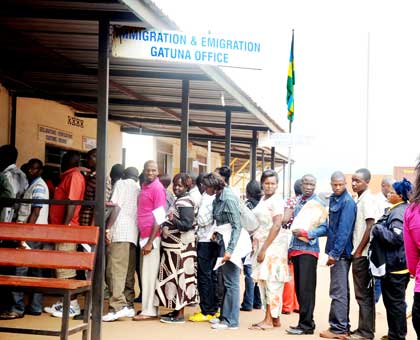Effective New Year’s Day, Rwandans and citizens from Uganda and Kenya will start using their national identity cards to cross into the three countries, an initiative that would significantly ease free movement.


Effective New Year’s Day, Rwandans and citizens from Uganda and Kenya will start using their national identity cards to cross into the three countries, an initiative that would significantly ease free movement.Some people, especially regular travellers, look at the initiative as a positive development in cutting the red tape in the movement of people across the region.Those without identity cards will use voter’s cards and students’ identity cards.Regional travellers relievedPolly Muhiiza, a Rwandan working as IT specialist at Munyonyo Resort Hotel in Uganda, said as a regular traveller, the development is a fresh breeze."Much as our country has made all arrangements to ease acquisition of a passport, it is still an expensive process, especially when all you need is to cross into a neighbouring country,” Muhiiza said.Initially, a coupon will be issued to travellers indicating that they have moved out of the country and when they return, the coupon will be surrendered at the immigration offices.However, with time, the process will go electronic.Fiona Mutoni, a student at Kanombe Secondary School whose mother lives in Kenya, said travelling to visit her mother would be eased."Getting a passport or Laissez-Passer is expensive and takes time, so with the use of identity card I will just cross over without any challenge,” she said.Samson Baranga, a Ugandan photojournalist, while welcoming the development, had some concerns, especially likely increase in cross-border crime, in case no measures are put in place to deter it."I have a feeling this facility will abused unless there are more stringent security measures are put in place... criminals will capitalise on this and easily cross borders and evade justice,” he said. Baranga said few Ugandans had national identity cards as well as voter’s cards, adding that this would curtail the implementation of the initiative. He said Ugandan authorities should expedite the process of issuing national identity cards to all nationals to facilitate the benefits of the regional integration process.Easing travel across borders is one of the decisions taken by the three countries under a tripartite arrangement, which also includes a single tourist visa.Use of tourist visaConcerning the implementation of the single tourist visa, Rwanda will print the first batch of visa stickers to be used in all the three countries for three months after which Kenya will follow and then Uganda.The single tourist visa implies that a tourist, who accesses a visa for any of the three countries, will be able to access the two other countries.After the rotational period, each country will be able to print its own.Monique Mukaruliza, the national coordinator of the tripartite arrangement, said they were in the process of distributing the visa stickers to the member countries to commence the implementation process.The visa will cost $100 (about Rwf66,500) valid for 90 days, and will be paid at the point of entry in a member country or foreign missions.The issuing country will take $40, including $10 for administrative cost, while other two members will share the remaining $60 equally.A holder of a single tourist visa will be able to travel around three countries without seeking any other travel document. This is expected to help market the region as a single tourist destination.The transfer of shares to other members will be done on quarterly basis, although a report indicating the performance will be released every month.The projected single visa is expected to save potential tourists time and the painstaking process of having to move from one embassy to another seeking different visas to travel to the three countries.The project, to be implemented under a tripartite arrangement, was agreed upon during a summit between the three Heads of State held in Uganda in June. The leaders of the three countries agreed to establish a single tourist visa, a single customs territory as well as fast track a joint railway line project, oil pipeline, and adopt national identity cards as travel documents.


